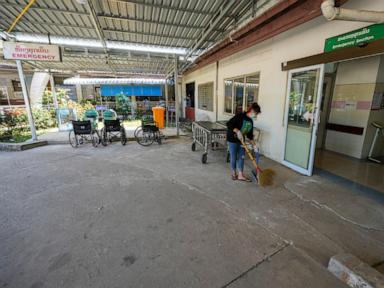
Dementia disproportionately affects women whether living with dementia or supporting someone living with dementia in aged care, a fact largely ignored in the final report of the Aged Care Royal Commission, an analysis by QUT health law researchers has found. Dr. Kristina Chelberg, from QUT's Australian Center for Health Law Research, said the gendered experiences of women with dementia and the unpaid work of women care partners of people with dementia in aged care were overlooked in the Australian Royal Commission into Aged Care Quality and Safety's (ACRC) final report.
Dr. Chelberg and Dr. Linda Steele, from University of Technology Sydney, explored the representation of women, dementia and aged care in the ACRC that informed the "once-in-a-generation" reforms contained in the new Aged Care Act, in an article published in the Journal of Aging Studies .
Dr. Chelberg said the Act failed to address gendered issues of dementia aged care even though 63% of people with dementia are women and 75% of care partners of people with dementia are women. "Using the ACRC's final report as a case study , we found it reflected global patterns, where the standard or normative gendered structure of aged care shaped both women's experiences of dementia, and supporting/or advocating for someone with dementia," Dr.
Chelberg said. "In particular, the harms experienced by women with dementia in aged care were overlooked, while the feminized labor of women care partners was taken for granted. "The ACRC was explicitly required to inquire into dementia and dementia care, as well as action to be taken to address findings of substandard care including mistreatment, abuse and systemic failures.
" Dr. Chelberg said their analysis of the Commission's Final Report found that women in aged care were not only devalued but were also represented as tiresome and troublesome, either for complaining or for their dementia-related behavior, and thus were undeserving of justice. "For women care partners, as well as experiencing frustration, guilt and grief on behalf of the person in aged care, those who acted as carer advocates or system navigators were ridiculed or labeled a 'difficult woman' when they complained about treatment or lack of it," she said.
"This is often in the context of deficient complaint management processes by the facility provider and by the regulatory body which simultaneously undermine, outsource and exploit women's care labor." Stark examples of the devaluation of women with dementia were seen in the representation of people with dementia, Dr. Chelberg said.
"The life stories of women with dementia represented in the Final Report were mainly in relation to their dementia and their family. "For example, 'Mrs. CA was born on 5 June 1936.
She was 82 years old at the time of the Sydney Hearing. Mrs. CA is married with five daughters and two sons.
Mrs. CA was diagnosed with Alzheimer's disease in or around 2010. She lived at home with her husband until May 2018.
' "Whereas men's pre-dementia identities mention career, achievements, community reputation and hobbies as well as family: 'The late Mr. CH was born in 1926. He grew up on a family farm in Morgan, South Australia.
He married B in 1954 and they had five children, one of whom is Ms. NH. Mr.
CH worked for much of his life as an orchardist on the same farm on which he grew up. He loved his community and was the Chairman of the Morgan Lions Club. Mr.
CH enjoyed restoring paddleboats on the Murray River and was a keen fisherman. In about 1991, Mr. CH developed dementia.
' "In the case of care partners, the Final Report's extracts noted cases where staff had spoken derogatorily about female care partners who had complained, the care partners spoke of feeling 'bullied and intimidated' by management, and being labeled as 'angry and difficult,'" Dr. Chelberg said. "Daughters experienced intimidation, exclusion, exhaustion, grief, and felt they were failing their parent, at the same time as their complaint, labor took them away from precious time with their loved one.
"Nevertheless, the Report depicted navigating, advocating and complaining as a normalized duty of women care partners and implicit work of female caring and did nothing more than praise them for their 'on-going and tireless advocacy.' "In sum, the Royal Commission neither included the voices of women with dementia, nor recognized the labor of women care partners, and thus reinforced, rather than challenged, the marginalized status of women in the aged care system." More information: Kristina Chelberg et al, Hidden in plain sight: Women and gendered dementia dynamics in the Australian Aged Care Royal Commission, Journal of Aging Studies (2024).
DOI: 10.1016/j.jaging.
2024.101285.














